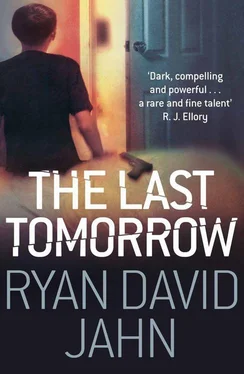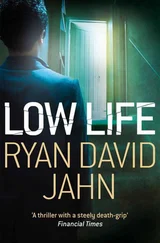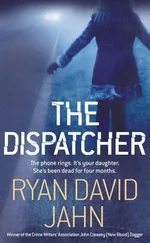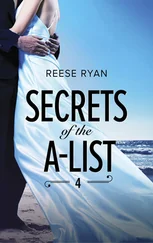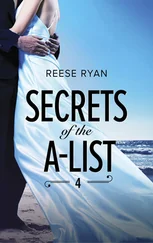Ryan Jahn - The Last Tomorrow
Здесь есть возможность читать онлайн «Ryan Jahn - The Last Tomorrow» весь текст электронной книги совершенно бесплатно (целиком полную версию без сокращений). В некоторых случаях можно слушать аудио, скачать через торрент в формате fb2 и присутствует краткое содержание. Год выпуска: 2012, ISBN: 2012, Издательство: Macmillan Publishers UK, Жанр: Триллер, на английском языке. Описание произведения, (предисловие) а так же отзывы посетителей доступны на портале библиотеки ЛибКат.
- Название:The Last Tomorrow
- Автор:
- Издательство:Macmillan Publishers UK
- Жанр:
- Год:2012
- ISBN:9780230766501
- Рейтинг книги:4 / 5. Голосов: 1
-
Избранное:Добавить в избранное
- Отзывы:
-
Ваша оценка:
- 80
- 1
- 2
- 3
- 4
- 5
The Last Tomorrow: краткое содержание, описание и аннотация
Предлагаем к чтению аннотацию, описание, краткое содержание или предисловие (зависит от того, что написал сам автор книги «The Last Tomorrow»). Если вы не нашли необходимую информацию о книге — напишите в комментариях, мы постараемся отыскать её.
The Last Tomorrow — читать онлайн бесплатно полную книгу (весь текст) целиком
Ниже представлен текст книги, разбитый по страницам. Система сохранения места последней прочитанной страницы, позволяет с удобством читать онлайн бесплатно книгу «The Last Tomorrow», без необходимости каждый раз заново искать на чём Вы остановились. Поставьте закладку, и сможете в любой момент перейти на страницу, на которой закончили чтение.
Интервал:
Закладка:
He thinks about how the kid embarrassed him. He thinks about how the kid made him feel stupid and weak. He refuses to be seen as stupid and weak. He refuses to be stupid and weak. A man is defined by his actions in difficult situations. If someone walks on you and you lie there, you’re a rug. You’re made to be walked on. Soon others will see the footprints on your back and know it too. It’s how a path is made. No, if someone tries to walk on you, you stop them. You stop them dead. You’re no rug and you will not be stepped on.
Teddy waits a long time.
There are false alarms. A drunk fellow stumbling to his car. Someone taking out a bag of trash to throw into a bin in the alley. A stray dog. Occasionally while he waits the tide of anger and humiliation goes out and he thinks about leaving, about simply driving away, and if he were to do that things would turn out differently, not only for him but for many people — because his actions and the actions of a small boy named Sanford Duncan fifteen miles away will affect the lives of several people whom they will never meet — but every time he considers absenting himself, driving back to his hotel and getting some sleep, he thinks again about what happened in there, and the tide of emotion comes flooding back.
Eventually when the red door opens it’s the kid.
Teddy refuses to think of him by his name. He can have no name, for things with names deserve to live. To Teddy he’s simply the kid.
The kid reaches into his pocket and removes his wallet. He pulls a narrow cigarette from within and puts it between his lips. He lights the cigarette with a match. He pinches it between finger and thumb and takes a deep drag, holding it in for some time before releasing a wave of smoke and jagged coughs.
The scent comes to Teddy on the breeze. The kid’s smoking a reefer.
Teddy stands in the shadows at the back of the parking lot and lets him smoke it. He watches him while he smokes it. That greasy forehead. Those patches of acne. Again and again that son of a bitch shamelessly dealt him crooked hands. Then humiliated Teddy for calling him out on it. The little shit. The worthless little-
His face gets hot. A saltwater sting in the eye.
He steps out of the shadows and walks with great purpose across the black asphalt toward the kid. His steps are long and solid. Tears stream down his face.
As Teddy nears him the kid looks up while simultaneously hiding the reefer behind his back and saying, ‘It’s not what you-’ But then he recognizes Teddy and goes silent. When next he speaks his tone has changed. ‘ You ,’ he says.
‘Yes, me, you dismissive son of a bitch. You goddamn piece of-’
He swings the blade in an uncontrolled arc. The kid sees it coming and turns away. The blade slices through the back left shoulder of his shirt. At first it seems as though Teddy missed the person beneath. The fabric simply hangs in two pieces from the shoulder like a pair of sails on a windless day. Then the blood begins to flow. The pain must arrive with it, because Teddy watches it slap a grimace onto the kid’s face. The kid grabs at the bleeding spot and his eyes go wide and glistening, and for a moment, three ticks of the clock, four at most, there’s some chance that Teddy will be able to stop himself from going any further. Pity envelopes him. He recognizes the pain on the kid’s face so wholly it could be his own. He almost steps back and disappears into the shadows with an apology falling from his tongue.
But then the kid’s pained expression turns into a scowl.
‘You fat fuck,’ he says. ‘You have no idea what hell you just walked into.’
The kid reaches down to his boot.
Teddy knows he can’t let him get to it. The kid has a weapon there. A single-shot pistol. A knife. Something. Whatever it is, one thing’s clear. Teddy’s begun something he must finish. He swings the blade at the reaching arm and puts a deep gash into it. A sheet of blood pours from within. Then he swings again and the face opens up, the left cheek, revealing white bone, the Halloween skeleton beneath. Then he swings again, the throat opens with a clogged-drain gurgle, and he finds himself standing over this motionless thing which a moment ago was moving, which a moment ago was human.
There’s nothing left in Teddy now but sorry. All the rage and humiliation which were in him as he approached the kid and swung for the first time have vanished. It seems so long ago that he began this. Could it really have been less than a minute ago that he took that first step? He feels like a different person from the one who was standing at the back of the parking lot with bad intentions.
Who was that guy?
5
He drops the bloodied knife. It rattles against the asphalt before going still beside the kid’s dead body. He reaches down and touches the kid’s face and says the kid’s name. ‘Francis,’ he says. ‘Francis, are you. . are you okay?’
But of course he’s not okay, and he’ll never be okay again.
Teddy looks down at his hand. There’s blood on it, a lot of blood. There’s less on his coat sleeve, a few scattered droplets. It looks black beneath the light of the three-quarter moon. His mother told him once that you had to scrub bloodstains with soap and cold water right away if you hoped to get them out. This after he’d been punched in the nose on his way home from school, punched and had his hard-rock candy stolen. He’d bled down the front of his shirt, but his mom had managed to get the stains out, scrubbing them in the washtub. He liked to wear that shirt afterwards because it made it seem like the punch in the face had never happened. If it happened, where was the blood?
But some stains neither cold water nor hot can remove.
He turns away from the body and the blood pooling beneath it. If he were thinking clearly he’d pick up the knife, walk to his car, and drive back to the hotel, where he could clean himself up, discard his bloody clothes, and go to the bar freshened up and ready to chat with someone who might be willing to give him an alibi, some drunkard with no concept of time, yes, officer, he was drinking with me all night. But he’s not thinking clearly. The detached violence he thought he was capable of he was not. The violence was angry and scared and the scene bears witness to that.
He leaves the knife where it lies.
He walks with jerky, robotic steps, like a man suffering advanced syphilis, vertebrae welded together; walks across the parking lot, down the alley, toward Sunset Boulevard. He stands near the street and watches cars go by. Then he sits. Several more cars pass him. Streaks of color: green blue black. Then one does not pass by. It slows and pulls up in front of him. At first he can’t see it clearly, the headlights blinding him. Then it stops and he sees that it’s a Los Angeles County Sheriff’s car. A deputy sits behind the wheel, a young man with light brown hair and an Errol Flynn mustache. He looks down at Teddy and asks him, is everything all right.
‘I think I just killed someone,’ Teddy says. He looks down once more at his hand. ‘Can you — can you tell him I’m sorry?’
FIVE
1
Candice stands in the parking lot behind the nightclub at which she works on the corner of Venice and Hauser, just northwest of Sugar Hill, where the moneyed Negroes live. They started moving into the neighborhood, taking over the mortgages of dried-up oil barons and derailed railroad magnates, during the Great Depression, and the neighborhood’s northern border, Washington Boulevard, still stands as a sort of racial equator, with colored folk living primarily to the south. The nightclub is closed and silent, the voices and laughter which earlier enlivened it now only drunken memories, the neon-tube sign out front — which can normally be read from six blocks in either direction, pinning a name on the place, the Sugar Cube — is dark as the night itself, and but for two cars, the lot in which Candice now stands is empty. She leans against one of them, a blonde woman with her lips smeared red, her hair pin-curled, her dress inappropriate for a woman in almost any other profession.
Читать дальшеИнтервал:
Закладка:
Похожие книги на «The Last Tomorrow»
Представляем Вашему вниманию похожие книги на «The Last Tomorrow» списком для выбора. Мы отобрали схожую по названию и смыслу литературу в надежде предоставить читателям больше вариантов отыскать новые, интересные, ещё непрочитанные произведения.
Обсуждение, отзывы о книге «The Last Tomorrow» и просто собственные мнения читателей. Оставьте ваши комментарии, напишите, что Вы думаете о произведении, его смысле или главных героях. Укажите что конкретно понравилось, а что нет, и почему Вы так считаете.
